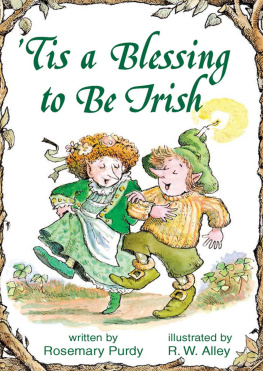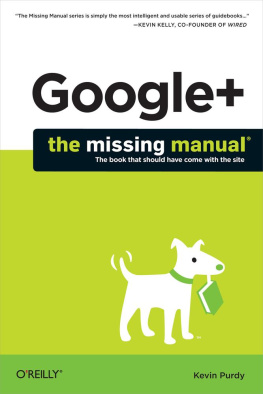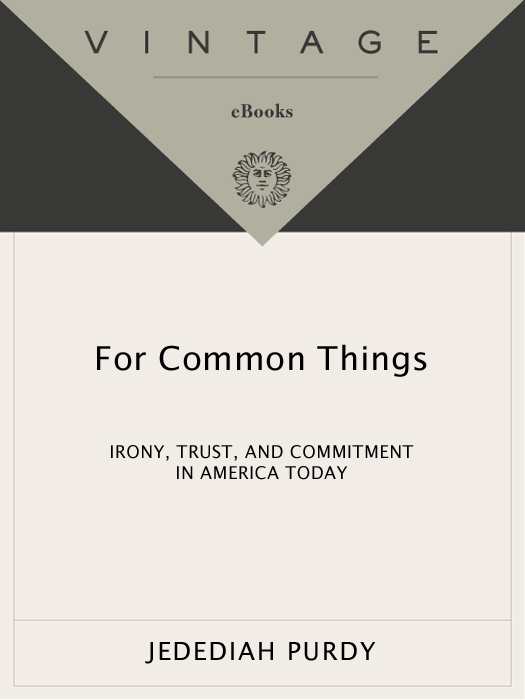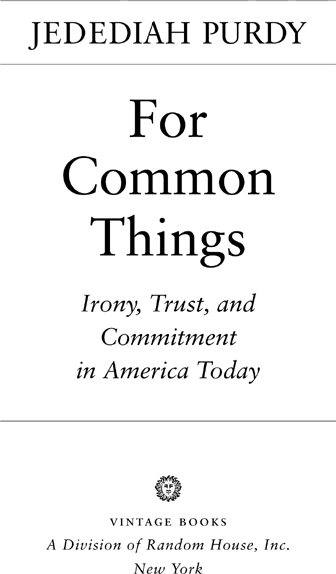Acclaim for JEDEDIAH PURDYs
For Common Things
Purdy argues that if we want to heal our national malaise, we should look toward the civic virtues of his parents world: attentiveness, honesty, devotion to place.The New York Times Book Review
The kind of book one finds recommending unreservedly to friends, colleagues, and neighbors.The Christian Science Monitor
Purdylike the masters whose sturdy prose he emulates, from Thoreau to Wendell Berrydisplays an acute awareness of the connection between private and public virtue. His book is inspiring in its thoughtfulness, in its commitment to the idea that politics should be about more than divvying up the pie, and in the care with which it is written.Publishers Weekly
With this, his first book, Purdy emerges as a fresh and vibrant voice calling for the renewal of commitment to and faith in American civil and political life. He offers original insights by and for a generation that is too little heard from, or perhaps listened to.Kirkus Reviews
If you think of young Americans as adrift and politically confused, this book will be a shock in a new way, after reading this book, you may only trust people under 30.
Thomas H. Geoghegan, author of The Secret Lives of Citizens and Which Side Are You On?
You have to admire Purdy for taking on the disease of irony, which some see as afflicting an entire generation. If many will not heed him, at least he has articulated a cure.The New York Times

JEDEDIAH PURDY
For Common Things
Jedediah Purdy was born and raised on a hillside farm in Chloe, West Virginia. Home-educated until he entered Phillips Exeter Academy in New Hampshire at sixteen, he returned to West Virginia after graduating and spent a year working in environmental politics, dividing his time between public policy and community work. Purdy attended college at Harvard, and since finishing his degree has concentrated in writing essays on culture and politics. He is studying law, environment, and social values at Yale.
For my family
and all my other teachers
Contents
What is unpronounced tends to nonexistence.
Czeslaw Milosz
Preface
T his book is a response to an ironic time. Irony has become our marker of worldliness and maturity. The ironic individual practices a style of speech and behavior that avoids all appearance of naiveteof naive devotion, belief, or hope. He subtly protests the inadequacy of the things he says, the gestures he makes, the acts he performs. By the inflection of his voice, the expression of his face, and the motion of his body, he signals that he is aware of all the ways he may be thought silly or jejune, and that he might even think so himself. His wariness becomes a mistrust of language itself. He disowns his own words.
In answer to all that, this book is a plea for the value of declaring hopes that we know to be fragile. It is an argument that those hopes are no less necessary for their fragility, and that permitting ourselves to neglect them is both reckless and impoverishing. My purpose in writing is to take our inhibition seriously, and to ask what would be required to overcome it, to speak earnestly of uncertain hopes.
To do so requires understanding todays ironic manner. There is something fearful in this irony. It is a fear of betrayal, disappointment, and humiliation, and a suspicion that believing, hoping, or caring too much will open us to these. Irony is a way of refusing to rely on such treacherous things. However, there is also something perceptive about irony, and sometimes we must wonder whether the ironist is right. The ironist expresses a perception that the world has grown old, flat, and sterile, and that we are rightly weary of it. There is nothing to delight, move, inspire, or horrify us. Nothing will ever surprise us. Everything we encounter is a remake, a rerelease, a ripoff, or a rerun. We know it all before we see it, because we have seen it all already.
What has so exhausted the world for us? For one, we are all exquisitely self-aware. Around us, commercials mock the very idea of commercials, situation comedies make being a sitcom their running joke, and image consultants detail the techniques of designing and marketing a personality as a product. We can have no intimate moment, no private words of affection, empathy, or rebuke that we have not seen pronounced on a thirty-foot screen before an audience of hundreds. We cannot speak of atonement or apology without knowing how those words have been put to cynical, almost morally pornographic use by politicians. Even in solitary encounters with nature, bicycling on a country road or hiking on a mountain path, we reluctant ironists realize that our pleasure in these places has been anticipated by a thousand L. L. Bean catalogues, Ansel Adams calendars, and advertisements promising a portion of the rugged or bucolic life. So we sense an unreal quality in our words and even in our thoughts. They are superficial, they belong to other people and other purposes; they are not ours, and it may be that nothing is properly ours. It is this awareness, and the wish not to rest the weight of our hopes on someone elses stage set, that the ironic attitude expresses.
Irony is a response to something else as well. In roughly the past twenty-five years, politics has gone dead to the imagination. It has ceased being the site of moral and historical drama. It has come to seem petty, tedious, and parochial.
This change would signify less if politics had mattered less than it has in recent decades. However, for more than two hundred years, politics has been among the great sources of inspiration and purpose, giving shape to many lives. From the radical period of the French Revolution onward there has stood the promise that politics can change the human predicament in elemental ways. Politics, on this promise, could erase all the foolish, cruel, maddening accretions of history and replace them with fair and humane arrangements where for the first time people would live as free as they are born. For both the revolutionaries whose ambitions convulsed the world and the crusading reformers of Britain and America, politics was the fulcrum on which women and men could move the lever of history. They needed only a firm place to stand to take up Archimedes old boast and move the world.
This extraordinary promise attracted the people with the greatest capacity and need for hope, the ones with the keenest sensitivity to suffering and cruelty and the strongest impulse to work against them. Politics was the means by which those who were most keenly aware of what should be could turn that moral truth into historical reality. Politics in effect took over the role of religion for many people in both this century and the last. It gave purpose to individual lives. Its aim of remaking the world carried the promise of redemption, both of whole societies and of the long labors of the individuals who worked to change them. Politics was the way to service, to heroism, and to sainthood.













